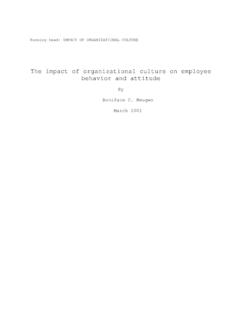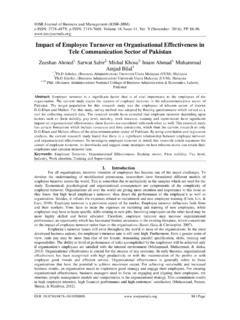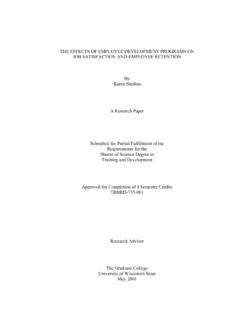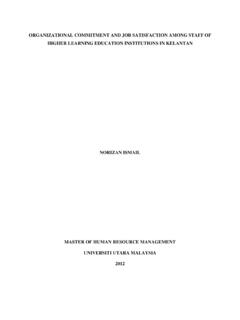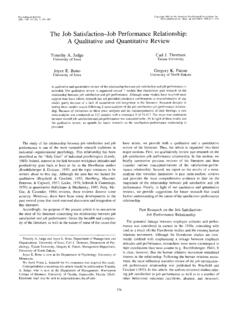Transcription of Impact of Organizational Culture on Organizational ...
1 INTERDISCIPLINARY JOURNAL OF CONTEMPORARY RESEARCH IN BUSINESS COPY RIGHT 2012 Institute of Interdisciplinary Business Research 975 JANUARY 2012 VOL 3, NO 9 Impact of Organizational Culture on Organizational Performance: An Overview Fakhar Shahzad MS Scholar and Visiting Lecturer The Islamia University of Bahawalpur, Punjab, Pakistan Rana Adeel Luqman (Corresponding author) MS Scholar and Lecturer Commerce Department The Islamia University of Bahawalpur, Punjab, Pakistan Ayesha Rashid Khan MS Scholar The Institute of Southern Punjab, Multan Lalarukh Shabbir MS Scholar The Institute of Southern Punjab, Multan Abstract: This article is on defining and measuring of Organizational Culture and its Impact on the Organizational performance, through an analysis of existing empirical studies and models link with the Organizational Culture and performance. The objective of this article is to demonstrate conceptualization, measurement and examine various concepts on organization Culture and performance.
2 After analysis of wide literature, it is found that Organizational Culture has deep Impact on the variety of organizations process, employees and its performance. This also describes the different dimensions of the Culture . Research shows that if employee are committed and having the same norms and value as per organizations have, can increase the performance toward achieving the overall organization goals. Balance Scorecard is suggested tool to measure the performance in the performance management system. More research can be done in this area to understand the nature and ability of the Culture in manipulating performance of the organization. Managers and leaders are recommended to develop the strong Culture in the organization to improve the overall performance of the employees and organization. Keywords: Impact , Organization Culture , Organization Performance, employee s commitment , Organizational goals.
3 INTERDISCIPLINARY JOURNAL OF CONTEMPORARY RESEARCH IN BUSINESS COPY RIGHT 2012 Institute of Interdisciplinary Business Research 976 JANUARY 2012 VOL 3, NO 9 Introduction: Organizational development is depends on analysis and identification of the factors that conclude the effectiveness of the organization. Organizations and managers are willing to get employees commitment , which leads to improve the productivity. Management would like to introduce employee with norm, values and objectives of the organization which is importance to understand the Organizational Culture . It is the responsibility of the management to introduce the Organizational Culture to its employees that will assist the employees to get familiar with the system of organization. Management must try to always keep learning environment in the organization.
4 Proper understanding of Organizational Culture should leads towards improvement of employee s performance. As per Organizational development is concerned, employees performance consider as a back bone for the industry. So organization s wants to get the loyalty of their employees towards organization. The complete knowledge and awareness of Organizational Culture should help to improve the ability to examine the behavior of organization which assists to manage and lead (Brooks, 2006). Pettigrew (1979) was used the term Organizational Culture first time in the academic literature for his study in the journal of Administrative Science Quarterly . It is necessary for the management to identify the norms and values of the organization of the employees. It should be needed that Culture of the organization should be developed in a way to improve the style of employee s performance and continuous develop the quality awareness.
5 Purpose of Study The primary purpose of this article is to understand the definition, conceptualization, and measurement the link of Organizational Culture and Organizational performance and also to examine the nature of this relationship. What is Culture ? Culture is arrangement of different attributes that express an organization and differentiate the firm from other one (Forehand and von Gilmer, 1964). According to Hofstede (1980), Culture is the collective thinking of minds which create a difference between the members of one group from another. As per Schein (1990), defines Culture is set of different values and behaviors that may considered to guide to success. According to the Kotter and Heskett (1992), Culture means fairly established set of beliefs, behaviors and values of society contain generally. In simple words we can understand that Culture is gained knowledge, explanations, values, beliefs, communication and behaviors of large group of people, at the same time and same place.
6 Understand Organizational Culture : Culture idea must be learned and shared in the organizations (Titiev, 1959). Pettigrew (1979), argue that cultures of organization based on cognitive systems which help to explain how employees think and make decision. He also noted the different level of Culture based on the multifaceted set of beliefs, values and assumptions that determine ways to organizations to conduct its business. According to Tichy (1982), Organizational Culture is known as normative glue means to hold the overall organization together. The concept of Organizational Culture also makes available a base for determination the differentiation that may survive in-between the organizations that are doing business in the same national Culture (Schein, 1990). The concept of Culture is generally used in the concept of organizations now-a-days (Kotter and Heskett, 1992). Organizational Culture could be build up by two essentials factors INTERDISCIPLINARY JOURNAL OF CONTEMPORARY RESEARCH IN BUSINESS COPY RIGHT 2012 Institute of Interdisciplinary Business Research 977 JANUARY 2012 VOL 3, NO 9 of social group; structural stability of a group and integration of single item in superior standard (Schein, 1995).
7 Hodgetts and Luthans (2003), define the different characteristics that are associated with the Culture of organization. Culture may defined as system of common values which can be estimated that people describe the similar organization Culture even with different background at different levels within the organization (Robbins & Sanghi, 2007). As per Stewart (2010), stated that organization s norms and values have a strong affect on all of those who are attached with the organization. It is considered by him that norms are invisible but if the organizations want to improve the performance of the employees and profitability, norms are places first to look. Counter Culture Shared beliefs and values which are in directly opposite to the values and beliefs of the broader Organizational Culture recognized as countercultures, it mostly formed around a forceful manager or leader (Kerr, J.)
8 , & Slocum, J. W., Jr. 2005). This type of Culture may be bearded by the firm whenever positively contributing to the improvement of the Organizational performance. But it is considered as a danger for the original Organizational Culture . Sub Culture According to Schein (1995), subculture is the segments of Culture which show different norms, values, beliefs and behavior of people due to difference in geographical areas or departmental goal and job requirements (within organization). Perception of employees about subculture was connected to employee s commitment towards the organization (Lok, Westwood and Crawford, 2005). Some groups may have a similar enough Culture within to allow for social interaction outside the workplace. Strong Culture Culture of organization is considered strong, where the greater part of the employees holds the same type of beliefs and values as concern to the organization.
9 Culture of organization is believed strong, where the greater part of the employees embraced the same sort of beliefs and values as concern to the organization (Deal and Kennedy, 1982). They agreed that managers should try to reduce the gap between employees to develop a strong relationship. Management also considered that employees are more important than rules in the organization. Week Culture A weak Culture of organization could be one that is loosely knit. Some time it may push individual thought, contributions and in a company that needs to grow through innovation, it could be a valuable asset, some time not. According to Deal and Kenndy (1982), a weak Culture of organization could be one of that is loosely joined. Rules are imposed strictly on the employees that may create diversity between the person s personal objectives and Organizational goals.
10 Characteristics of Organizational Culture : According to Dasanayaka and Mahakalanda (2008), maximizing employee s values are considered as rational assets that required a Culture to support their logical participation both for individual and Organizational learning, new knowledge formation and readiness to share with others. Schein (1992), tells that Organizational Culture is very important today as compare with past. Hodgetts and Luthans (2003), define some of the characteristics of the Organizational Culture : 1. Norms are measured by things like as amount of work done and also the level of cooperation between management and employees of the organization. INTERDISCIPLINARY JOURNAL OF CONTEMPORARY RESEARCH IN BUSINESS COPY RIGHT 2012 Institute of Interdisciplinary Business Research 978 JANUARY 2012 VOL 3, NO 9 2. Clearly rules are defined for employee s behavior associated to the productivity, intergroup cooperation and customer relationship.

